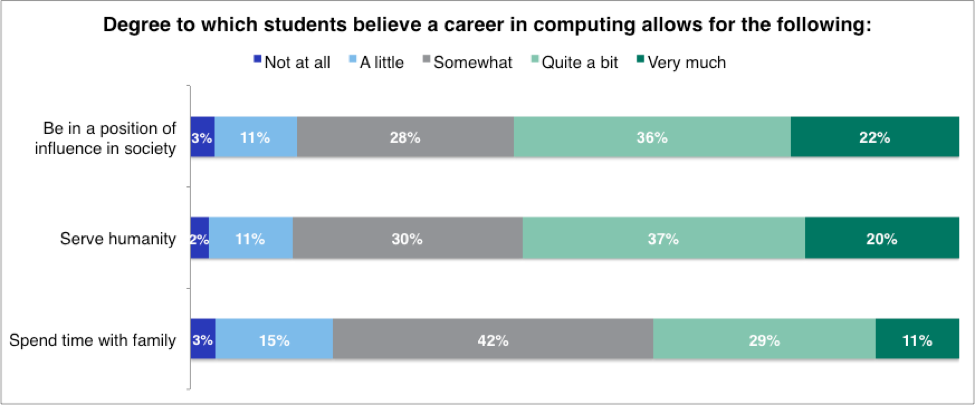Students Believe Computing Careers Provide Less Opportunity for Family, But More Opportunities to be Influential and Altruistic

CERP analyzed data from 11,626 undergraduate computing students surveyed during the fall 2016 semester via the Data Buddies Project and the BRAID Research initiative. Students were asked to report on the degree to which they believed a computing career would allow them to (a) be in a position of influence in society, (b) serve humanity, and (c) spend time with family. As seen in the graphic, most students believe computing careers afford ample opportunity to be in a position of influence in society and to serve humanity. However, students believe computing careers afford relatively less opportunity to spend time with family. This finding has negative implications for diversity in computing because students from underrepresented racial and ethnic groups and/or students who are first-generation college students tend to place a strong value on family [1,2]. These findings suggest computing careers may be unattractive to these groups of students.
Notes. Students were asked the following question on a scale from [1] Not at all to [5] Very much: In your opinion, to what extent would a career in computing allow you to do the following? (1) be in a position of influence in society, (2) serve humanity, and (3) spend time with family. A repeated measures Analysis of Variance indicated students believe a computing career affords the opportunity be in a position of influence, serve humanity, and spend time with family to a differential degree, F(2,11625) = 664.44, p < .001. Specifically, post hoc tests using a Bonferroni correction indicated students believe a computing career allows one to be in a position of influence (mean [M] = 3.63, standard deviation [SD] = 1.04) and serve humanity (M = 3.61, SD = 1.00) to a significantly greater degree than spend time with family (M = 3.29, SD = .96), p < .001.
References
[1] Gaines, S., Marelich, W., Bledsoe, K., Steers, W., Henderson, M., Granrose, C., … Page, M. S. (1997). Links between race/ethnicity and cultural values as mediated by race/ethnic identity and moderated by gender. Journal of Personality and Social Psychology, 72, 1460–1476.
[2] Stephens, N. M., Fryberg, S. A., Markus, H. R., Johnson, C., & Covarrubias, R. (2012). Unseen disadvantage: How American universities’ focus on independence undermines the academic performance of first-generation college students. Journal of Personality and Social Psychology, 102, 1178–1197.
 This analysis is brought to you by the CRA’s Center for Evaluating the Research Pipeline (CERP). CERP provides social science research and comparative evaluation for the computing community. To learn more about CERP, visit our website and subscribe to our newsletter.
This analysis is brought to you by the CRA’s Center for Evaluating the Research Pipeline (CERP). CERP provides social science research and comparative evaluation for the computing community. To learn more about CERP, visit our website and subscribe to our newsletter.
This material is based upon work supported by the National Science Foundation under Grant Number (CNS-1246649; and DUE-1431112). Any opinions, findings, and conclusions or recommendations expressed in this material are those of the author(s) and do not necessarily reflect the views of the National Science Foundation.
Tags:
CERP, CERP Infographics, Data, Diversity









